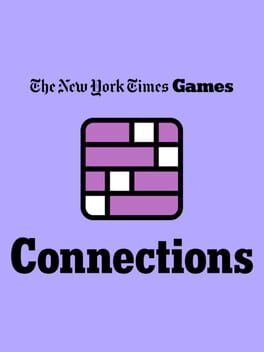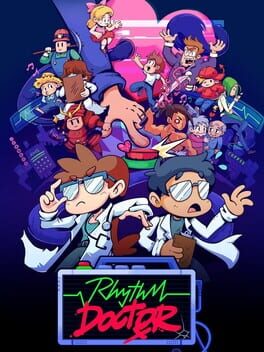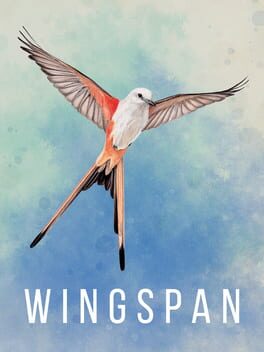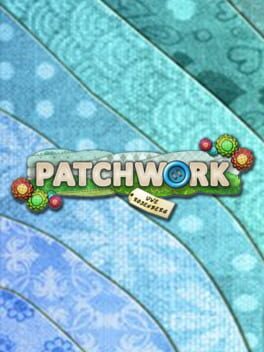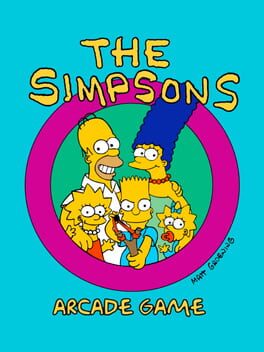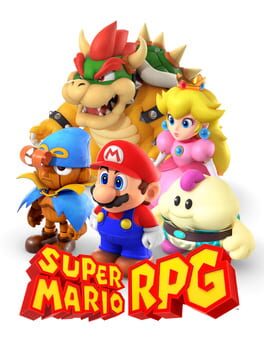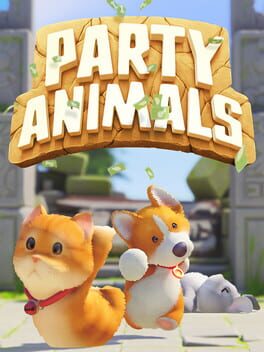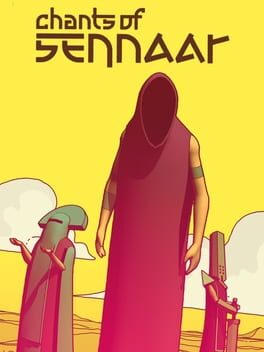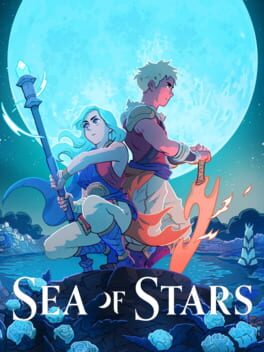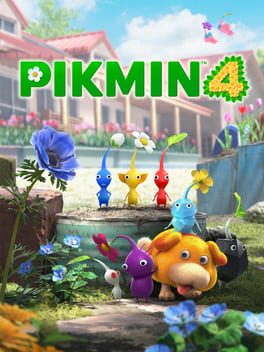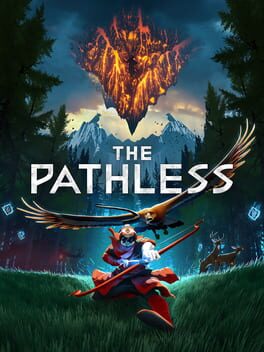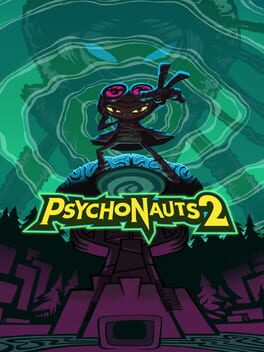vogelscript
BACKER
2023
The design is elegant and quick to play. The fun depends heavily on the quality of the daily puzzle, which can have clues that vary wildly between making you feel like a genius and being frustratingly obtuse. It's also a game best enjoyed with people to share results with and vent about the clues. I bounced off it when it first came out, but became addicted when I could "compete" with a group. I'd like the game even more if it had better built in stat tracking, even something as simple as attempt distributions and win rates like Wordle.
2021
I don't normally play a lot of rhythm games but if they have good music, it's not hard to fall in love with them. Rhythm Doctor has more than an outstanding soundtrack: its graphics often transcend the boundaries of pixel art, its characters have narratives that are tied together by a loose overall plot, and it boasts exclusively one-button gameplay that manages to constantly evolve despite its simplicity. The hospital and heartbeat theming works well too—it both provides a backdrop for the beat-based gameplay and sets up the story arcs for the patients you are trying to cure.
The difficulty is exactly where I want it to be as well. Most levels weren't hard enough to halt my progress in the story, but A ranks or higher take some practice that is addicting and satisfying to master. The game is still in early access and new content is still being developed, and I can tell the later level packs are starting to get more challenging. I was disappointed to learn the game isn't complete, but there's a plethora of content already available including five story acts, bonus collab levels, story-based minigames, a level editor, and even a two-player mode.
I loved almost every moment of this game and really have nothing to nitpick. At the time of this review, it's been in early access for almost two years and it seems like it may take another two years for the full release to be ready. If the final chapters and story continue the quality of the rest of the game, this could easily be one of the all-time greatest rhythm games.
The difficulty is exactly where I want it to be as well. Most levels weren't hard enough to halt my progress in the story, but A ranks or higher take some practice that is addicting and satisfying to master. The game is still in early access and new content is still being developed, and I can tell the later level packs are starting to get more challenging. I was disappointed to learn the game isn't complete, but there's a plethora of content already available including five story acts, bonus collab levels, story-based minigames, a level editor, and even a two-player mode.
I loved almost every moment of this game and really have nothing to nitpick. At the time of this review, it's been in early access for almost two years and it seems like it may take another two years for the full release to be ready. If the final chapters and story continue the quality of the rest of the game, this could easily be one of the all-time greatest rhythm games.
I had a fantastic time playing Mario Wonder. It was addicting, delightful, fun, innovative, and surprising. If you have any interest in Mario (or just want to have a good time), play it immediately either solo or with a friend. I feel the quality of the game mostly speaks for itself and not much else needs to be said, but I will briefly highlight a few of my favorite and least favorite elements anyway.
I loved both the variety in level designs and also the level types—the latter is not something I've seen explored as much in previous 2D Mario games. Aside from traditional platforming, there are puzzle levels, badge challenges, combat arenas, and other fun distractions. They serve well to break up traditional gameplay, even though the platforming levels themselves are already unbelievably unique and varied.
The online multiplayer is my favorite multiplayer Nintendo has ever done. Working together in real-time with random online strangers to solve puzzles or save each other from death is wholesome and satisfying. It's amazing how communicative people can be with four emotes and a little crouch spamming. It definitely makes the game too easy at times, but it's so fun that it felt lonely to play with those features turned off.
The local multiplayer is a little less desirable, especially with more than two players. Ceding camera control to one player completely is annoying and I prefer how the older games handled it. It gets too chaotic with more than two players and becomes more of a party game than a serious platformer. The boss fights leave a lot to be desired given how varied the rest of the game is. And finally, the music wasn't as memorable as other Mario titles. It's still great and it was married well with the gameplay in several of the levels, but it's a high bar to clear and left me somewhat disappointed.
I hope the next Mario title continues Wonder's expressiveness and variety of level designs and animation. And if it doesn't, I will happily continue showing this game to people and replaying it myself for years to come.
I loved both the variety in level designs and also the level types—the latter is not something I've seen explored as much in previous 2D Mario games. Aside from traditional platforming, there are puzzle levels, badge challenges, combat arenas, and other fun distractions. They serve well to break up traditional gameplay, even though the platforming levels themselves are already unbelievably unique and varied.
The online multiplayer is my favorite multiplayer Nintendo has ever done. Working together in real-time with random online strangers to solve puzzles or save each other from death is wholesome and satisfying. It's amazing how communicative people can be with four emotes and a little crouch spamming. It definitely makes the game too easy at times, but it's so fun that it felt lonely to play with those features turned off.
The local multiplayer is a little less desirable, especially with more than two players. Ceding camera control to one player completely is annoying and I prefer how the older games handled it. It gets too chaotic with more than two players and becomes more of a party game than a serious platformer. The boss fights leave a lot to be desired given how varied the rest of the game is. And finally, the music wasn't as memorable as other Mario titles. It's still great and it was married well with the gameplay in several of the levels, but it's a high bar to clear and left me somewhat disappointed.
I hope the next Mario title continues Wonder's expressiveness and variety of level designs and animation. And if it doesn't, I will happily continue showing this game to people and replaying it myself for years to come.
2020
Wingspan has perennially been one of my all-time favorite board games. It's a card-driven engine building game with endless variety (especially with expansions), and a welcoming and educational theme. Although I much prefer the physical game, the app is a great entry-point thanks to the lower price and the full tutorial.
I'm not a big board game app player, but it's clear that a lot of care and attention went into this implementation. It features an original soundtrack, voice acting for the bird facts, bot AI, and even small animations for the bird art. My biggest issue is with the interface; it's designed with a one-size-fits-all approach across mobile and PC. This means every platform looks the same despite varying screen sizes and control methods. There's no way to nicely view an overview of all three bird rows and all the information you need at once. There are different view modes, but regardless of the one you choose, multiple swipes/clicks/taps are needed to scroll through everything. What's worse is that there's no way to lay out or organize your hand, which is a critical part of effective strategic planning in this game.
I'd recommend this app for those wanting to learn and get into the game. But I believe the original game is still the best and fastest way to play. Hopefully my interface quibbles can be fixed with updates eventually.
I'm not a big board game app player, but it's clear that a lot of care and attention went into this implementation. It features an original soundtrack, voice acting for the bird facts, bot AI, and even small animations for the bird art. My biggest issue is with the interface; it's designed with a one-size-fits-all approach across mobile and PC. This means every platform looks the same despite varying screen sizes and control methods. There's no way to nicely view an overview of all three bird rows and all the information you need at once. There are different view modes, but regardless of the one you choose, multiple swipes/clicks/taps are needed to scroll through everything. What's worse is that there's no way to lay out or organize your hand, which is a critical part of effective strategic planning in this game.
I'd recommend this app for those wanting to learn and get into the game. But I believe the original game is still the best and fastest way to play. Hopefully my interface quibbles can be fixed with updates eventually.
2016
The strength of the original board game completely carries this app implementation of it. It's a fantastic 2-player abstract game that I will never grow tired of. It's perfect for fans of Tetris, puzzles, or low-stakes economic optimization.
But the app has it's issues (at least on Android). Some of the menus are buggy and don't close properly, and I wish there was a portrait mode option that allowed for your player board to be larger. But the biggest shame is that loading times and animations take a while, and this is designed to be a quick game with snappy back and forth turns. If playing asynchronously and you're waiting on push notifications for your turn, it can take the game longer to boot up, login, load the game, and play the animation for your opponent's turn than it does to take your actual move.
In short, I'd highly recommend the physical board game first, or the more streamlined web-based Board Game Arena version. But if you really like the game, or want to play against the AI or friends online, then this app is serviceable and can be fun.
But the app has it's issues (at least on Android). Some of the menus are buggy and don't close properly, and I wish there was a portrait mode option that allowed for your player board to be larger. But the biggest shame is that loading times and animations take a while, and this is designed to be a quick game with snappy back and forth turns. If playing asynchronously and you're waiting on push notifications for your turn, it can take the game longer to boot up, login, load the game, and play the animation for your opponent's turn than it does to take your actual move.
In short, I'd highly recommend the physical board game first, or the more streamlined web-based Board Game Arena version. But if you really like the game, or want to play against the AI or friends online, then this app is serviceable and can be fun.
Like many co-operative arcade games it gets boring quickly if you have unlimited plays. Understandable when there are no stakes (in this case, financial pressure) to stay alive. There isn't a lot of combat variety, but some of the level locations, boss fights, and cutscenes are fun. Something about the game motivated me and a friend to see it all the way through, and that's worth something I suppose.
2023
This is such a delightful game that never ceases to be witty, cute, and fun. These are traits that many of the other Mario RPGs share, but having never played the first one before, it's impressive that Nintendo & Square got so much of the formula nailed down on the first try.
The remake itself is a beautiful and faithful update of the original. I love the re-arranged soundtrack, expressive animations, and quality of life enhancements like party-member switching without wasting a turn. It's one of the few RPG's I've played where I felt like I could comfortably use my whole party despite an in-battle limit of three. The only aspect that still felt dated was the lack of voice clips for the characters; made even more obvious by the missing text-box progression sound. It was the only noticeable blemish on an otherwise super polished experience.
What stood out to me most about this game compared to the other Mario games or RPGs was the huge variety of enemies and character designs. With hundreds of unique monsters to catalogue in the newly added journal menu, it almost felt like a Pokemon game (but if each Pokemon had cute dialogue like you'd find in Undertale). Many of them re-use attacks and animations, but they all have unique lore entries and thoughts that can be discovered with Mallow's Thought Peek ability. My insistence on doing this for every fight definitely limited the strategic options, but the main story wasn't difficult enough for that to truly be a concern. The post game boss fights ramp up the challenge, testing both my action-timing ability and my patience.
Like many Nintendo games, the narrative shines during the smaller scale situations the characters find themselves in along the journey, rather than the overall plot. That high-level story is serviceable (and frankly the Mario Bros Movie would have been more interesting with it than the story it actually had), but it's a shame the smaller villains and bosses are more memorable and fun than the final boss. Despite a couple lackluster moments, the beauty of this game is that it's still such a breeze to play through. I could easily see myself playing it again in a couple years as a wholesome and fun experience to lift my mood.
The remake itself is a beautiful and faithful update of the original. I love the re-arranged soundtrack, expressive animations, and quality of life enhancements like party-member switching without wasting a turn. It's one of the few RPG's I've played where I felt like I could comfortably use my whole party despite an in-battle limit of three. The only aspect that still felt dated was the lack of voice clips for the characters; made even more obvious by the missing text-box progression sound. It was the only noticeable blemish on an otherwise super polished experience.
What stood out to me most about this game compared to the other Mario games or RPGs was the huge variety of enemies and character designs. With hundreds of unique monsters to catalogue in the newly added journal menu, it almost felt like a Pokemon game (but if each Pokemon had cute dialogue like you'd find in Undertale). Many of them re-use attacks and animations, but they all have unique lore entries and thoughts that can be discovered with Mallow's Thought Peek ability. My insistence on doing this for every fight definitely limited the strategic options, but the main story wasn't difficult enough for that to truly be a concern. The post game boss fights ramp up the challenge, testing both my action-timing ability and my patience.
Like many Nintendo games, the narrative shines during the smaller scale situations the characters find themselves in along the journey, rather than the overall plot. That high-level story is serviceable (and frankly the Mario Bros Movie would have been more interesting with it than the story it actually had), but it's a shame the smaller villains and bosses are more memorable and fun than the final boss. Despite a couple lackluster moments, the beauty of this game is that it's still such a breeze to play through. I could easily see myself playing it again in a couple years as a wholesome and fun experience to lift my mood.
Spider-man 2 stood out to me in two ways: gameplay variety and technical prowess. I constantly was having fun, and the slickness of the gameplay itself kept me engaged more than the story. The story isn't bad, and had some incredible moments, but it's not going to be memorable enough for the game to persist in my 5-star echelon of all-time greats.
This game was non-stop fun. I thought it was very well paced, although I can see how some would argue it had plenty of slow "walking and talking" parts to tell the story. As a counterpoint, I considered those sections as a nice break from the action, and a way to increase the variety of open-world activities that weren't combat or traversal focused. I love the combat in this game, and it was a good difficulty balance for me: not too easy enough to become boring but also not overly frustrating. But even the best combat games need other segments to break up the action. Open-world games tend to fall short when quests or side-tasks boil down to "fight some dudes" or "fetch a thing". When Insomniac relies on those mechanisms, there is a some story thread to tie the repetitive tasks together. But they didn't rely purely on those, because they also threw in two unique puzzle mini-games, photography, drone chases, and quests that allow you to explore New York in unexpected ways.
On a technical level, the game is equally impressive. Putting aside all the the bespoke mini-games/quick-time events (I'm thinking Coney Island specifically), the graphics and performance are outstanding. As a huge city and architecture nerd, traversing New York City will never disappoint. The lighting system is incredible both for high-up vistas and indoor sections like sewer crawls. Outside of the visuals, this is the first PS5 game where I really noticed the extra immersion offered by Dual-sense controller. The audio design (especially for the Venom sections) utilizes the controller's speaker and haptics to the fullest. And I should mention the fast travel as well; the smoothness of the animation and quick loading times make it a joy to use, despite rarely having a reason to. Spider-man's top technical showcase means I would hastily recommend this game to anyone even if they aren't an action or superhero fan, simply for the joy of traversal, detailed immersion, and city exploration alone.
I won't talk as much about story and that's mostly because it didn't leave an impact for me. This is the first time I've been exposed to any of the Venom story arc, yet it still played out pretty much exactly how I expected. The narrative was told well with a mix of quiet moments and jaw-dropping fights, but I'm about two months past beating the game and I'm already struggling to remember what the stand-out moments were.
This game is an easy recommendation to almost anyone. I love it a lot, but it's missing that "little bit extra" to push it into 5-stars. It's hard to articulate exactly what that is but I'm super pleased with my time spent in the game overall.
This game was non-stop fun. I thought it was very well paced, although I can see how some would argue it had plenty of slow "walking and talking" parts to tell the story. As a counterpoint, I considered those sections as a nice break from the action, and a way to increase the variety of open-world activities that weren't combat or traversal focused. I love the combat in this game, and it was a good difficulty balance for me: not too easy enough to become boring but also not overly frustrating. But even the best combat games need other segments to break up the action. Open-world games tend to fall short when quests or side-tasks boil down to "fight some dudes" or "fetch a thing". When Insomniac relies on those mechanisms, there is a some story thread to tie the repetitive tasks together. But they didn't rely purely on those, because they also threw in two unique puzzle mini-games, photography, drone chases, and quests that allow you to explore New York in unexpected ways.
On a technical level, the game is equally impressive. Putting aside all the the bespoke mini-games/quick-time events (I'm thinking Coney Island specifically), the graphics and performance are outstanding. As a huge city and architecture nerd, traversing New York City will never disappoint. The lighting system is incredible both for high-up vistas and indoor sections like sewer crawls. Outside of the visuals, this is the first PS5 game where I really noticed the extra immersion offered by Dual-sense controller. The audio design (especially for the Venom sections) utilizes the controller's speaker and haptics to the fullest. And I should mention the fast travel as well; the smoothness of the animation and quick loading times make it a joy to use, despite rarely having a reason to. Spider-man's top technical showcase means I would hastily recommend this game to anyone even if they aren't an action or superhero fan, simply for the joy of traversal, detailed immersion, and city exploration alone.
I won't talk as much about story and that's mostly because it didn't leave an impact for me. This is the first time I've been exposed to any of the Venom story arc, yet it still played out pretty much exactly how I expected. The narrative was told well with a mix of quiet moments and jaw-dropping fights, but I'm about two months past beating the game and I'm already struggling to remember what the stand-out moments were.
This game is an easy recommendation to almost anyone. I love it a lot, but it's missing that "little bit extra" to push it into 5-stars. It's hard to articulate exactly what that is but I'm super pleased with my time spent in the game overall.
2023
2023
Cocoon is a visually engrossing and mentally stimulating puzzle game. The setting stood out to me first. It is acutely alien, with fantastical flora, critters that are both cute and creepy, and environments that feel different from the classic video game biomes. The whole package is sold by a plethora of bespoke and fluid animations, in addition to sound design that is more atmospheric rather than melodical. Each "world" is contained within an orb, and the player can move in and out of these orbs, while also manipulating them inside each other, which forms the core of the puzzle gameplay. The pacing of the game felt unique too, as there isn't much of a clear structure to when you find new orbs or fight bosses, adding to the wonder and mystery of the world. Although there's not a clear story or narrative, I did find myself attached to each of my orbs in a very organic and funny way, much like the companion cube in Portal.
As the player you can only move and do a few actions: grab or release an object (you can also long press the button to activate some elements). Everything happens with one button, and with an accessibility option in the menu, any combination of joysticks and face/trigger buttons on a controller can be used for the game. (Sidenote: I love playing lazily with one hand and having the option to switch my grip whenever a hand gets tired. So few games are playable like this.) There aren't many actions, but each orb (and each world within) has unique mechanics so there ends up being a decent variety in gameplay. There are also boss fights which have you dodging in various ways and damaging a weak spot using a key object unique to that fight.
A single word I would use to describe the gameplay is "smooth". The puzzles slowly escalate, and never focus on one mechanic too long before moving on to the next thing. Some of the more mind-bendy twists of the world-within-world concept are only used once and then never again. The game is very strict about keeping the player on-track, and fail states are impossible (natural gates automatically appear at various stages to lock the player into an area, preventing needless backtracking when stuck). Once realizing this, it's easy to deduce solutions as every element in the area was necessary and nothing superfluous was kept. Because of this, and the fact that the possible actions are always quite limited, I never found any puzzle difficult and there's always exactly one solution for each one. This rigid approach to puzzle design eliminates a lot of frustration that can be present in other puzzle games, but also reduces the creativity and "eureka" moments. There are plenty of clever puzzles here, but I attributed that cleverness mostly to the designers for creating them, rather than myself for finding the solutions. This could have been a game with zero frustration, except for one late-game boss fight which tested my patience by requiring several sequences of precise timing and aim.
I loved this game mostly because of its atmosphere, fluid controls, and concise playtime. The puzzles were clever, and despite never truly testing me, it was a pleasure simply discovering all the twists the designers devised. The fluidity of the movement and animations made the game fun to interact with as well. I highly recommend this one, and due to it's friendly level design, it could be great for novices of the genre as well.
As the player you can only move and do a few actions: grab or release an object (you can also long press the button to activate some elements). Everything happens with one button, and with an accessibility option in the menu, any combination of joysticks and face/trigger buttons on a controller can be used for the game. (Sidenote: I love playing lazily with one hand and having the option to switch my grip whenever a hand gets tired. So few games are playable like this.) There aren't many actions, but each orb (and each world within) has unique mechanics so there ends up being a decent variety in gameplay. There are also boss fights which have you dodging in various ways and damaging a weak spot using a key object unique to that fight.
A single word I would use to describe the gameplay is "smooth". The puzzles slowly escalate, and never focus on one mechanic too long before moving on to the next thing. Some of the more mind-bendy twists of the world-within-world concept are only used once and then never again. The game is very strict about keeping the player on-track, and fail states are impossible (natural gates automatically appear at various stages to lock the player into an area, preventing needless backtracking when stuck). Once realizing this, it's easy to deduce solutions as every element in the area was necessary and nothing superfluous was kept. Because of this, and the fact that the possible actions are always quite limited, I never found any puzzle difficult and there's always exactly one solution for each one. This rigid approach to puzzle design eliminates a lot of frustration that can be present in other puzzle games, but also reduces the creativity and "eureka" moments. There are plenty of clever puzzles here, but I attributed that cleverness mostly to the designers for creating them, rather than myself for finding the solutions. This could have been a game with zero frustration, except for one late-game boss fight which tested my patience by requiring several sequences of precise timing and aim.
I loved this game mostly because of its atmosphere, fluid controls, and concise playtime. The puzzles were clever, and despite never truly testing me, it was a pleasure simply discovering all the twists the designers devised. The fluidity of the movement and animations made the game fun to interact with as well. I highly recommend this one, and due to it's friendly level design, it could be great for novices of the genre as well.
2023
Chants of Sennaar hooked me with its stunning visuals and addicting language-learning gameplay loop. I began in an unknown world with mysterious symbols and people all around, and I had a strong intrinsic motivation to uncover the meaning of the symbols and the story behind the people. After learning the basics of the language, I felt more comfortable with the setting and was excited to complete the definitions for the last few glyphs. And when I finally had everything defined, there was only a brief moment of complete understanding with everything before entering the next area. I was presented with a new language and environment to explore, but could use my knowledge of the old language to more quickly learn the new one. This repeated cycle of naive curiosity to complete understanding (and back) was satisfying every step of the way, and it held my attention completely for the 9-10 hour story.
The game has a very natural way of easing the player into the systems for deciphering the language, and you learn to pick up on a variety of clues including environmental puzzles, NPCs pointing and speaking, and sculpted murals. It allows you to type in a personal guess for each symbol at any time, and these guesses are only validated in sets of 3-4 once the game decides you've seen enough clues to deduce the meaning. The UI is minimal but functional, and the only thing I wish it had was a world map. The environment design is stunning, with bold colors and line-work that excels at highlighting the architecture of the world in such a way that every screenshot could be a wallpaper. But this atmospheric design philosophy sometimes comes at the cost of practicality, most notably in the placement of fast travel spots which are often inconvenient and require some tedious backtracking to traverse between.
There are five distinct sections of the world, each with inhabitants that have their own culture and speak their own language. The languages have their fair share of unique words depending on the culture, and each look visually distinct, but grammatically they never differ more than how plurals are formed or where the object is placed. They also all have the commonality of logograms, where each word is one glyph. While easier to translate and gamify, it meant that all the languages felt the same linguistically which was kind of a disappointment. I got the sense that the languages were more of a set-dressing on top of a cryptographical puzzle game rather than a deep and informative linguistic exploration. It's still fun, just somewhat of a letdown from my expectations.
The game has a lot to say about communication, which it conveys through the gameplay itself rather than directly in the narrative or cutscenes. For example: the act of guessing a glyph's meaning, then verifying it to be quite different from the original guess, shows a lot about how multiple words can fit the same context but maybe their textbook differences aren't that important. It shows how different cultures can view the same thing in different ways, leading to misunderstanding or artificial barriers. I found this environmental storytelling truly absorbing, and the fantastic art direction and music only added to this.
Despite feeling like Chants of Sennaar could have done more with the languages themselves, and that it lacked some quality of life features, I loved the game and thought it created a unique and engrossing experience. It stands as one of the best in multiple genres: puzzle, adventure, and deduction.
The game has a very natural way of easing the player into the systems for deciphering the language, and you learn to pick up on a variety of clues including environmental puzzles, NPCs pointing and speaking, and sculpted murals. It allows you to type in a personal guess for each symbol at any time, and these guesses are only validated in sets of 3-4 once the game decides you've seen enough clues to deduce the meaning. The UI is minimal but functional, and the only thing I wish it had was a world map. The environment design is stunning, with bold colors and line-work that excels at highlighting the architecture of the world in such a way that every screenshot could be a wallpaper. But this atmospheric design philosophy sometimes comes at the cost of practicality, most notably in the placement of fast travel spots which are often inconvenient and require some tedious backtracking to traverse between.
There are five distinct sections of the world, each with inhabitants that have their own culture and speak their own language. The languages have their fair share of unique words depending on the culture, and each look visually distinct, but grammatically they never differ more than how plurals are formed or where the object is placed. They also all have the commonality of logograms, where each word is one glyph. While easier to translate and gamify, it meant that all the languages felt the same linguistically which was kind of a disappointment. I got the sense that the languages were more of a set-dressing on top of a cryptographical puzzle game rather than a deep and informative linguistic exploration. It's still fun, just somewhat of a letdown from my expectations.
The game has a lot to say about communication, which it conveys through the gameplay itself rather than directly in the narrative or cutscenes. For example: the act of guessing a glyph's meaning, then verifying it to be quite different from the original guess, shows a lot about how multiple words can fit the same context but maybe their textbook differences aren't that important. It shows how different cultures can view the same thing in different ways, leading to misunderstanding or artificial barriers. I found this environmental storytelling truly absorbing, and the fantastic art direction and music only added to this.
Despite feeling like Chants of Sennaar could have done more with the languages themselves, and that it lacked some quality of life features, I loved the game and thought it created a unique and engrossing experience. It stands as one of the best in multiple genres: puzzle, adventure, and deduction.
2023
This game gets a lot of credit for having lush, beautiful pixel art with many bespoke animations overlaid with modern lighting effects. It manages to invoke old JRPGs while also clearly being a huge technical leap forward. It does this with the character movement too; traversing the world isn't just walking in 4 or 8 directions, it also involves jumping over gaps, shimmying over ledges, climbing walls, and generally interacting with the world in much more fluid way. The soundtrack is also wonderful, catchy, and fits the world well.
Sea of Stars more than deserves all the praise it gets for these things, and I think that carries the experience for many people. For me though, it wasn't enough to finish the game after about 5 hours of play time. I found the rest of it pretty lackluster. The story and characters didn't grip me at all, the puzzles were never complex enough to be engaging, and the combat seemed really shallow and not very customizable. I like that it borrows the interactive turn-based approach from the Mario RPGs, but I found the animations were poorly choreographed and the timings too hard to hit. There is also very little customization for stats or items, leaving characters with a small and static pool of abilities.
Despite the beauty and polish of the overall package, I needed either the combat or story to be compelling enough for me to be motivated to finish the game. There's a chance I could return to it later, but there are other RPGs I'd rather play first.
Sea of Stars more than deserves all the praise it gets for these things, and I think that carries the experience for many people. For me though, it wasn't enough to finish the game after about 5 hours of play time. I found the rest of it pretty lackluster. The story and characters didn't grip me at all, the puzzles were never complex enough to be engaging, and the combat seemed really shallow and not very customizable. I like that it borrows the interactive turn-based approach from the Mario RPGs, but I found the animations were poorly choreographed and the timings too hard to hit. There is also very little customization for stats or items, leaving characters with a small and static pool of abilities.
Despite the beauty and polish of the overall package, I needed either the combat or story to be compelling enough for me to be motivated to finish the game. There's a chance I could return to it later, but there are other RPGs I'd rather play first.
2023
Pikmin 4 managed to capture me in a way few other games have, becoming easily one of my favorite gaming experiences of 2023. Something about the process of exploring levels and caves to completion is so addicting. I'm not usually much of a completionist, but the structure of this game rewards those tendencies so well. It shows satisfying percentage increases at the end of every level, it has a detailed encyclopedia of objects and creatures packed to the brim with funny flavor text and detailed lore, and constantly cycles through a large variety of challenge so the experience doesn't have time to get stale. Although I usually dislike time pressure in games, the timed dandori challenges were surprisingly fun. And learning to master the efficiency puzzle, especially late game as difficulty ramped up, was so rewarding. Oatchi also provides a huge quality of life boost to the series, acting both as a super-sized Pikmin and a controllable captain, so he becomes an excellent multi-tasking tool. The way all the Pikmin jump on his back never ceases to be cute but is also extremely functional for deftly navigating hazards.
Speaking of cuteness, the animations and sound design for all the Pikmin are polished to a level of charming perfection. The balance between cozy cuteness and ruthless death is something the Pikmin series strikes so well. It's accessible for anyone to pick up and play, and the difficulty is never a problem until the end and post game. Despite that, I find the game's excessive tutorialization incredibly annoying and demeaning. The other captains frequently remind you of basic functions even 20 hours into the story. Nintendo games often struggle with this, but it seems worse here. The game could have been just as accessible with fewer tutorial prompts and repetitive, obtrusive cutscenes. My only other negative are the horrendous loading times. You get a 30-60 second loading screen every time you enter and exit a cave or other level, and while understandable considering the detail of the levels, is disappointing and disrupts the flow.
I think Pikmin 4 is a game everyone should play regardless of familiarity with the series. There's a ton of gameplay variety for all the possible Pikmin playstyles. It's easy to get into for new players, but also has many optional challenges in the post-game. It captures the sense of exploration well, and revealed my inner desire to collect everything that I didn't know I had.
Speaking of cuteness, the animations and sound design for all the Pikmin are polished to a level of charming perfection. The balance between cozy cuteness and ruthless death is something the Pikmin series strikes so well. It's accessible for anyone to pick up and play, and the difficulty is never a problem until the end and post game. Despite that, I find the game's excessive tutorialization incredibly annoying and demeaning. The other captains frequently remind you of basic functions even 20 hours into the story. Nintendo games often struggle with this, but it seems worse here. The game could have been just as accessible with fewer tutorial prompts and repetitive, obtrusive cutscenes. My only other negative are the horrendous loading times. You get a 30-60 second loading screen every time you enter and exit a cave or other level, and while understandable considering the detail of the levels, is disappointing and disrupts the flow.
I think Pikmin 4 is a game everyone should play regardless of familiarity with the series. There's a ton of gameplay variety for all the possible Pikmin playstyles. It's easy to get into for new players, but also has many optional challenges in the post-game. It captures the sense of exploration well, and revealed my inner desire to collect everything that I didn't know I had.
2020
The movement is really fun and the music is good, but that's about all that carries the game for me. I found the world design boring and monotonous. Although there are rewards for exploration, the game's lack of explanation for many of the mechanics gave me little reason to care about those rewards. It seemed like the main unlockable ability was extra jumps while gliding, which wasn't exciting nor was the progression fast enough to be satisfying. The corrupted storms, stealth sections, and boss fights felt like crude interruptions during the rest of peaceful, movement-based gameplay that I enjoyed. That sort of intense experience is not what I'm looking for nor what I expected for a game like this, but I may return to it later if in the right mood.
2021
This is a charming and creative game, where the overarching narrative and characters standout above all else. Compared to the first game, the moment-to-moment dialogue wasn't as humorous in my opinion, but the representation of each of the characters and their backgrounds were more fleshed out. The story comes together mostly near the end with a lot of exposition, but still managed to leave me with a small desire to replay the game and see how many early hints there are for the game's ultimate conclusion. Much like its predecessor, a good part of the story is revealed through optional vault collectibles, which is rewarding while not being too punishing if you miss them. There is also a ton of extra dialogue you can discover both throughout the main story and after its completion; the latter serves as a nice epilogue for everything that I wish more games had.
The platforming is also vastly improved, both in terms of controls and movement options, but the rough edges of the first game may have been rounded off too much which makes this one easy by comparison. Despite an uncrowded playing field of 3D platformers, it's still not up there with games like Mario or A Hat in Time gameplay-wise. But it does excel at having plenty of collectibles that are both useful and fun to collect, with the hundreds of unique figment designs that are surprisingly satisfying to scoop up.
The best parts of Psychonauts have always been the level design, graphical and artistic variety, and how the narrative intertwines with gameplay. None of this core is missing here. The boosted fidelity of modern platforms allows the levels to really pop, with my favorites being the Psi King and Cassie's Collection. There are many noticeable visual glitches when transitioning to and from cutscenes, but it doesn't detract from the experience that much. What's worse for my tastes is the audio design: it feels a little underbaked. Sometimes the sound effects are not mixed properly, or are completely lacking for some animations or events. Characters often repeat one-liners dozens of times when performing certain activities, with bosses and Raz being the worst offenders of this. Often, there are characters talking over each other when multiple triggers happen at once, and only one set of lines is ever subbed at a time. This level of unpolished audio existed in the first game too, and I'm surprised it still stands out to me as much as it does. That said, I do love the music in this game and it's a vast improvement from the often repetitive and static tracks in the original.
This is a game I may actually want to replay in the future, or at least watch someone replay it to experience the story again. I had a great time throughout. It's lacking a little bit of polish in places that is noticeable to me but may not be an issue for others, and the gameplay/difficulty wasn't engaging enough to put it in the top-tier of platformers. But I still loved it for what it is, and can tell a ton of heart and care went into this title.
The platforming is also vastly improved, both in terms of controls and movement options, but the rough edges of the first game may have been rounded off too much which makes this one easy by comparison. Despite an uncrowded playing field of 3D platformers, it's still not up there with games like Mario or A Hat in Time gameplay-wise. But it does excel at having plenty of collectibles that are both useful and fun to collect, with the hundreds of unique figment designs that are surprisingly satisfying to scoop up.
The best parts of Psychonauts have always been the level design, graphical and artistic variety, and how the narrative intertwines with gameplay. None of this core is missing here. The boosted fidelity of modern platforms allows the levels to really pop, with my favorites being the Psi King and Cassie's Collection. There are many noticeable visual glitches when transitioning to and from cutscenes, but it doesn't detract from the experience that much. What's worse for my tastes is the audio design: it feels a little underbaked. Sometimes the sound effects are not mixed properly, or are completely lacking for some animations or events. Characters often repeat one-liners dozens of times when performing certain activities, with bosses and Raz being the worst offenders of this. Often, there are characters talking over each other when multiple triggers happen at once, and only one set of lines is ever subbed at a time. This level of unpolished audio existed in the first game too, and I'm surprised it still stands out to me as much as it does. That said, I do love the music in this game and it's a vast improvement from the often repetitive and static tracks in the original.
This is a game I may actually want to replay in the future, or at least watch someone replay it to experience the story again. I had a great time throughout. It's lacking a little bit of polish in places that is noticeable to me but may not be an issue for others, and the gameplay/difficulty wasn't engaging enough to put it in the top-tier of platformers. But I still loved it for what it is, and can tell a ton of heart and care went into this title.
